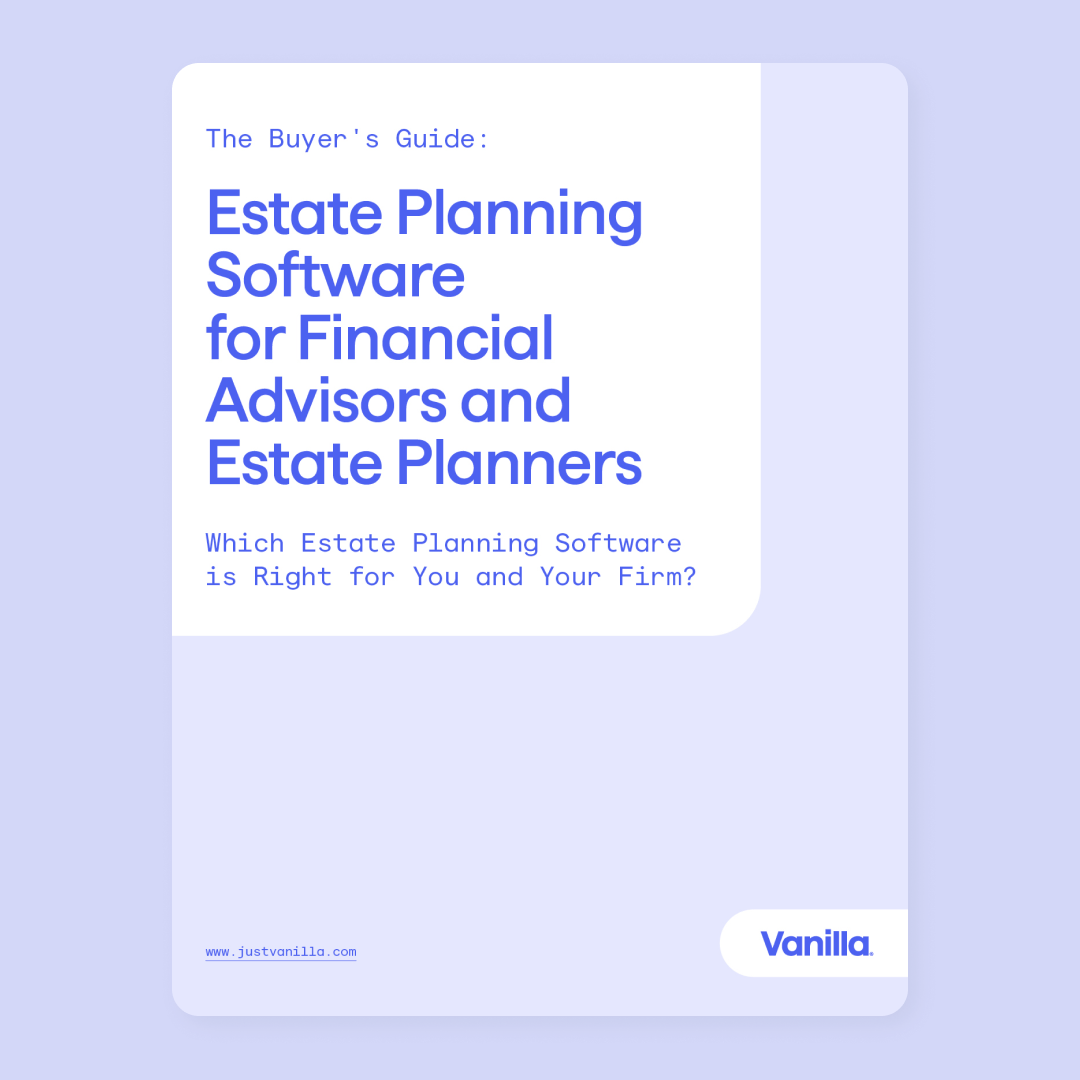Estate planning software can make the complex process of estate planning simpler and more efficient for advisors and planners as well as their clients. And it can help ensure your client has the right strategy to meet their goals. But how do you know which software is right for you and your firm? There are a variety of important factors to consider.
In this buyer’s guide, you’ll gain insight into what to look for to ensure the estate planning software you’re considering meets your needs, including:
- An overview of the different types of estate planning software
- Gaps in software that may prove detrimental
- How to establish your vendor criteria
- The benefits of the right estate planning software
- Security, support and integrations requirements
As a part of this guide, you’ll also receive a checklist to help you evaluate different estate planning solutions you’re considering.
Below is an excerpt from the guide.
Proving impact: The benefits of the right estate planning software for financial advisors and estate planners
For advisors, taking on another piece of software either means absorbing the cost or passing it on to clients – and either way, you’ll want to ensure that the cost of the software is worth the value it brings to your firm. You’ll likely need to make a case for it to both leadership and cross-organizational stakeholders.
With estate planning software, it’s helpful to examine both the short term and long-term benefits. Below are a few benefits to consider. Just remember that not every estate planning solution will offer all of these benefits – so it’s important to choose one that aligns with your needs.
Prospecting new clients
Winning new business may not be the first thing that comes to mind when you think of estate planning software, but the right software provides a powerful entry point with prospective clients. Estate planning is confusing to most new clients. Showing them how you can make sense of their estate plan and build (or create from scratch) a strategy for their family is powerful. Estate planning also allows you an entree into the kinds of intimate details that help you better understand your clients and cement a deep, lasting relationship.
Questions to ask
Does this software enable me to prospect more effectively?
How can I showcase this product to prospective clients to prove value?
Growing business with existing clients
Often, advisors will only manage a part of a client’s portfolio. Estate planning necessitates gathering information on the entire breadth of assets the client owns, including portfolios that may not be under your purview. This information can help you find opportunities where you might expand your asset management and provide additional value to existing clients. To gain this benefit, you’ll want to make sure the estate planning software you use gives you a centralized view of all of the client’s assets.
Questions to ask
Does the software enable me to go deeper with my clients?
Will the software help prove continual value over time?
Differentiation: Showing clients value beyond the portfolio
Investment advice is important, but in recent years, with the accessibility of index funds and robo-advisors, it’s become less of a differentiator for firms. Although clients often want investment advice as a part of their advisor’s offering, it alone does not set a firm apart. Nearly every advisory firm does some form of investment management, and rarely do they beat the index. But offering estate strategy – really offering it and not just handing it off to a partner attorney – truly differentiates your firm. It shows a holistic approach to financial advising that goes far beyond the portfolio. It helps answer the question that sometimes lingers in the back of clients’ minds: What am I really getting for my money?
Questions to ask
How does the software help differentiate your firm?
Will this software help showcase your value to clients?
Delivering at scale: Empowering more effective collaboration
The best estate planning isn’t done in a silo. And the best software for estate planning enables collaboration – specifically between the financial advisor, estate planner, and client. While allowing the financial advisor to steer the client relationship, the most advanced estate planning software empowers the estate strategists who support the advisor by eliminating manual workflows and simplifying estate reviews. And RIAs who may not have the support of estate specialists will want to look for software that can provide that level of support for them, through estate abstractions. With the right software, this cooperation between estate planners and financial advisors can lead to huge efficiencies and scalability.
Questions to ask
Is this software built for financial advisors and estate strategists to collaborate?
Does this software make accurate documentation abstraction easier and eliminate manual workflows?
Published: Jan 10, 2024


